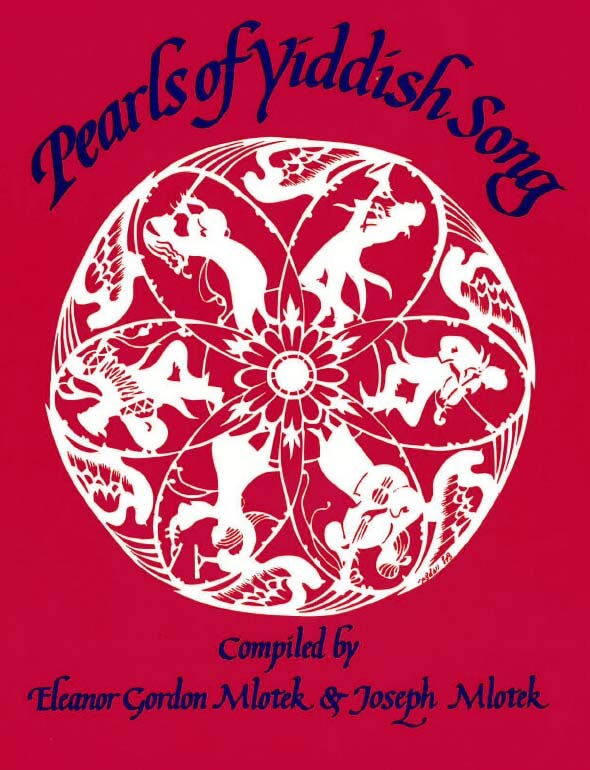Words and music by Rubin Doctor (1882-19-?). Zuni Maud used the melody for a song “Kumt an opereyter” (When an operator comes), published in Sam Liptzin’s collection in 1954. The song was revived in the Off-Broadway musical The Golden Land (1982-87).

I am single again, just like a bachelor,
I’ve divorced my wife. I thought of moving and looked for a room to sleep in.
But my wife convinced me:
— Why look for bargains and suffocate in strange rooms and be alone and talk to the wall?
Stay here just like before.
Be a boarder now with me.
So I pay her rent like a stranger.
Refrain:
I’m a boarder at my wife’s.
It’s so good, so pleasant!
Men, it’s great!
She gives me everything.
When I come home, she asks no questions.
I’ll tell you now quite frankly that I feel fortunate.
Better to be a boarder than a husband.
I don’t have to guard my wife and come in the middle when the butcher brings in the meat.
I’m free of worry.
I don’t have to borrow or lend, nor work and bring her the money.
From the time that I’ve become her boarder, it’s good for me without an end.
I eat and drink and I enjoy life.
Ikh bin shoyn vider ‘singl’
Punkt ‘zoy vi a yingl,
Mit mayn vaybl hob ikh zikh geget.
Gedenkt hob ikh tsu ‘mufn,’
A ‘rum’ gezukht tsu shlofn,
Hot mayn vaybl mikh ibergeredt:
— Vos darfstu zukhn glikn,
In fremde ‘rums’ zikh shtikn,
Un zayn aleyn un redn tsu di vent,
Blayb do iber punkt vi fri’r
Zay a ‘border’ yetst bay mir.
Vi a fremder tsol ikh ir dem rent.
Refrain:
Ikh bin a ‘border’ bay mayn vayb,
Ay gut, ay voyl, ay gut,
Mener, iz dos a tay’rer ‘dzhab’
Ay gut, ay voyl, ay gut.
Zi ‘atendet’ mikh mit ales,
Ven ikh kum-fregt zi keyn shayles,
Ikh bin a ‘border’ bay mayn vayb.
Ikh zog aykh yetst oysdriklekh
Az ikh fil zikh gliklekh,
Beser als a ‘border’ eyder man.
Ikh darf mayn vayb nit hitn
Un onkumen in mitn,
Ven der ‘butsher’ brengt dos fleysh arayn.
Ikh bin gants fray fun zorgn,
Ikh darf nit layen, borgn,
Nit arbetn un brengen ir dos gelt.
Nor tsayt ikh bin in ‘bord’ bay ir,
Iz mir gut gor on a shir,
Ikh es un trink nor
Un ikh bren a velt.
Es iz a fargenign,
Ales ken ikh krign,
Vi a fremder ‘border’ bay mayn vayb,
Ikh bin gornit keyn griner,
Un yedn tog nokh ‘diner’
Leyg ikh zikh tsu azoy tsum tsayt-fartrayb.
Oy, frier flegt zi mir sheltn
Un iberkern veltn
Gor mit a fremdn ‘border’ in mayn shtib,
Nor tsayt ikh bin in ‘bord’ bay ir,
Iz zi azoy gut tsu mir,
Es kost mir bilik un zi hot mikh lib.
איך בין שױן װידער „סינגל‟
פּונקט ‘זױ װי אַ ייִנגל,
מיט מײַן װײַבל האָב איך זיך געגט.
געדענקט האָב איך צו „מופֿן‟,
אַ „רום‟ געזוכט צו שלאָפֿן,
האָט מײַן װײַבל מיך איבערגערעדט:
— װאָס דאַרפֿסטו זוכן גליקן,
אין פֿרעמדע „רומס‟ זיך שטיקן,
און זײַן אַלײן און רעדן צו די װענט,
בלײַב דאָ איבער פּונקט װי פֿריִ’ר
זײַ אַ באָרדער יעצט בײַ מיר.
װי אַ פֿרעמדער צאָל איך איר דעם רענט.
רעפֿרײן:
איך בין אַ באָרדער בײַ מײַן װײַב,
אײַ גוט, אײַ װױל, אײַ גוט,
מענער, איז דאָס אַ טײַ’רער „דזשאַב‟
אײַ גוט, אײַ װױל, אײַ גוט.
זי „אַטענדעט‟ מיך מיט אַלעס,
װען איך קום פֿרעגט זי קײן שאלות,
איך בין אַ באָרדער בײַ מײַן װײַב.
איך זאָג אײַך יעצט אױסדריקלעך,
אַז איך פֿיל זיך גליקלעך,
בעסער אַלס אַ באָרדער אײדער מאַן.
איך דאַרף מײַן װײַב ניט היטן
און אָנקומען אין מיטן,
װען דער „בוטשער‟ ברענגט דאָס פֿלײש אַרײַן.
איך בין גאַנץ פֿרײַ פֿון זאָרגן,
איך דאָרף ניט לײַען, באָרגן,
ניט אַרבעטן און ברענגען איר דאָס געלט.
נאָר צײַט איך בין אין „באָרד‟ בײַ איר,
איז מיר גוט גאָר אָן אַ שיעור,
איך עס און טרינק נאָר
און איך ברען אַ װעלט.
עס איז אַ פֿאַרגעניגן,
אַלעס קען איך קריגן,
װי אַ פֿרעמדער באָרדער בײַ מײַן װײַב,
איך בין גאָרניט קײן גרינער,
און יעדן טאָג נאָך „דינער‟
לײג איך זיך צו אַזױ צום צײַט־פֿאַרטרײַב.
אױ, פֿריִער פֿלעגט זי מיר שעלטן
און איבערקערן װעלטן
גאָר מיט אַ פֿרעמדן באָרדער אין מײַן שטיב,
נאָר צײַט איך בין אין „באָרד‟ בײַ איר,
איז זי אַזױ גוט צו מיר,
עס קאָסט מיר ביליק און זי האָט מיך ליב.
Song Title: Ikh Bin A “Border” Bay Mayn Vayb

First published in 1988 as Pearls of Yiddish Song: Favorite Folk, Art and Theatre Songs, this anthology contains 115 songs. Some material had never been published, while others, included in rare song collections or sheet music, were largely inaccessible. The songs presented reflect Jewish life in Eastern Europe and the United States and depict childhood, love, family celebrations, poverty, work and struggle. There are also songs from the Hasidic and Maskilic movements, songs of Zion and of America, as well as songs from the Yiddish theater.
The title of this anthology derives from the weekly two-page feature column “Pearls of Yiddish Poetry,” which the compilers Yosl and Chana Mlotek initiated in 1970 in the Yiddish newspaper Der Forvertz (the Yiddish Daily Forward). Hundreds of readers from around the world — including authors, composers, singers, actors — became co-participants in this collective folk project and recalled melodies, lines, fragments, stanzas and their variants of songs, poems, and plays which they had heard in their youth. At first, readers sent in only written material. Later, they also taped songs on cassettes, many of whose melodies had, until then, never been recorded. They also identified and supplied missing information regarding lyricists, poets, and composers and described the circumstances surrounding the songs’ origins, their dissemination, diffusion and impact.